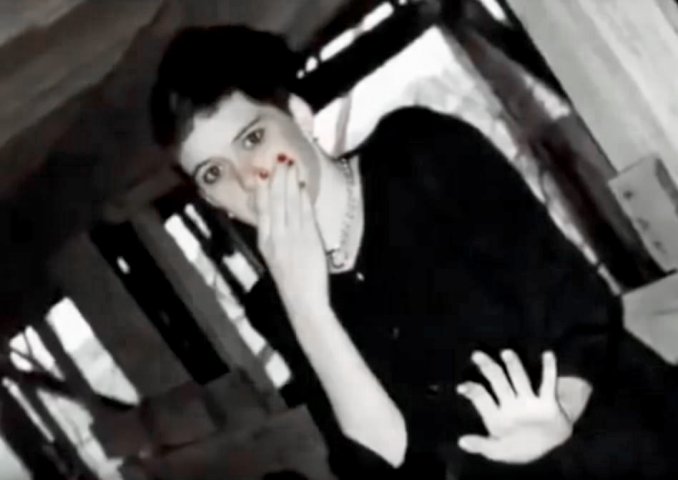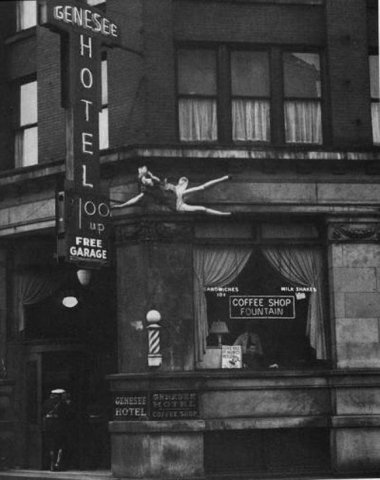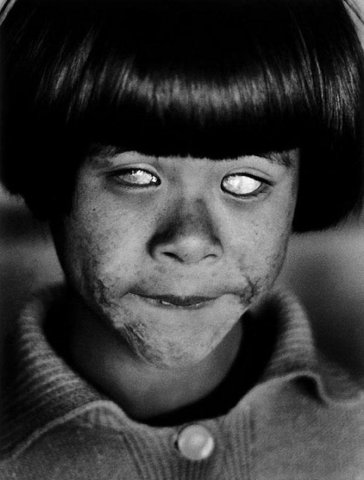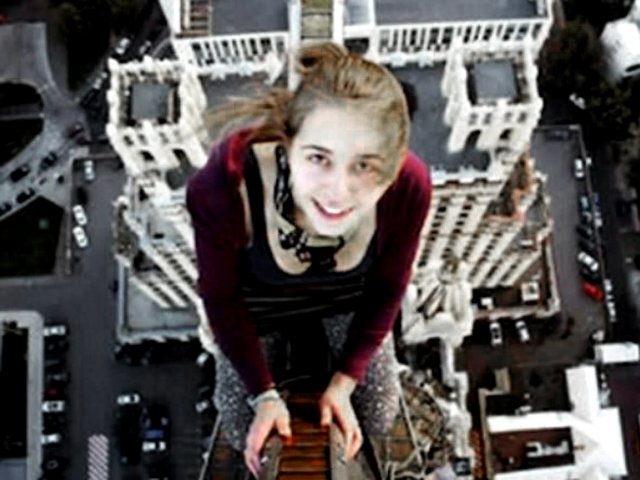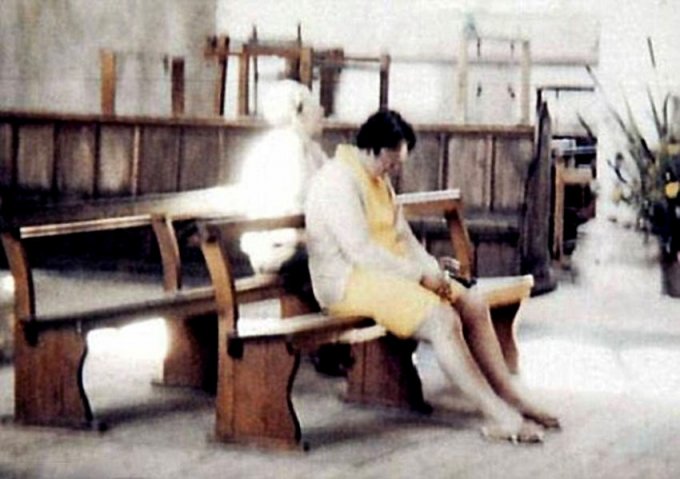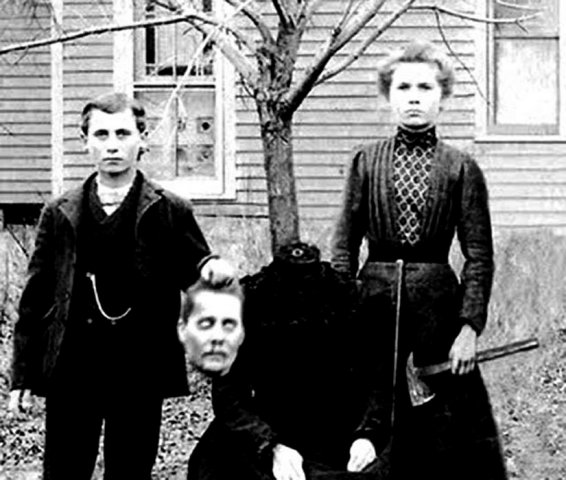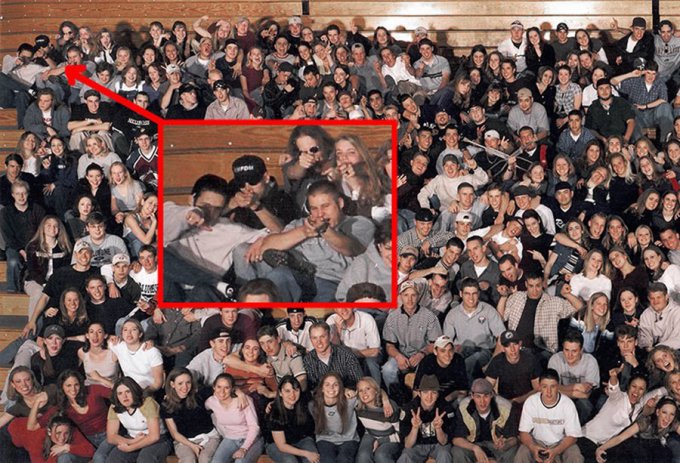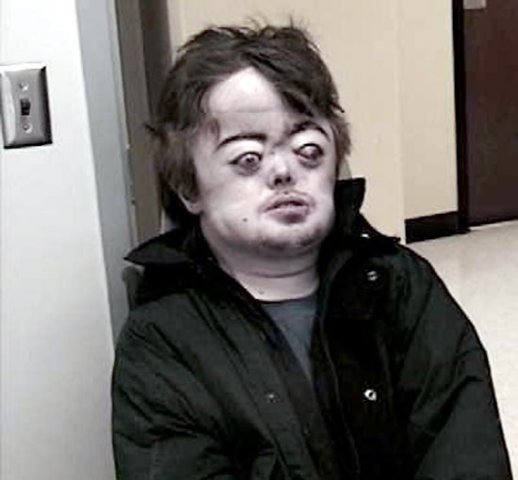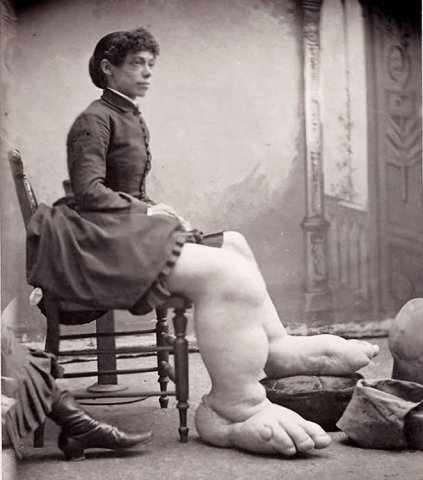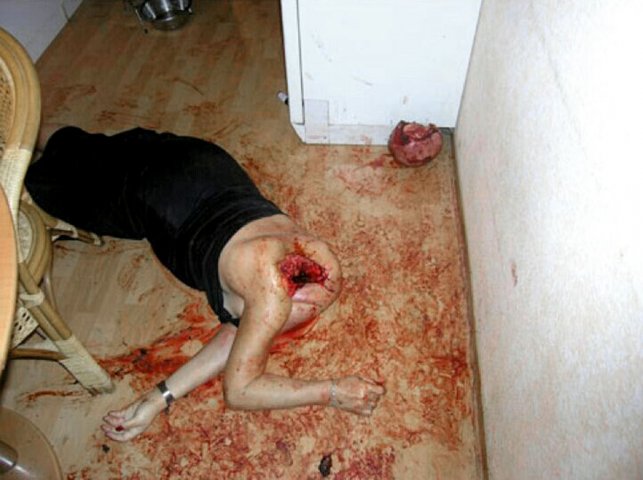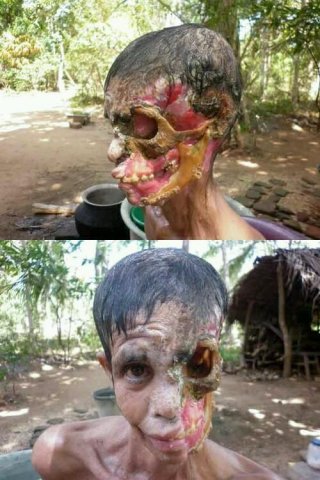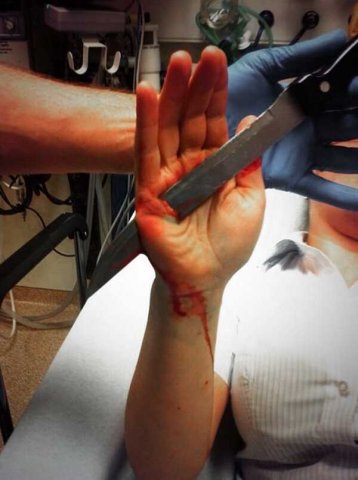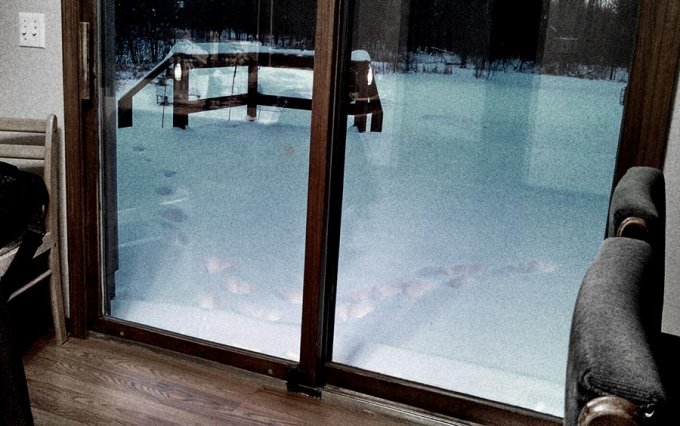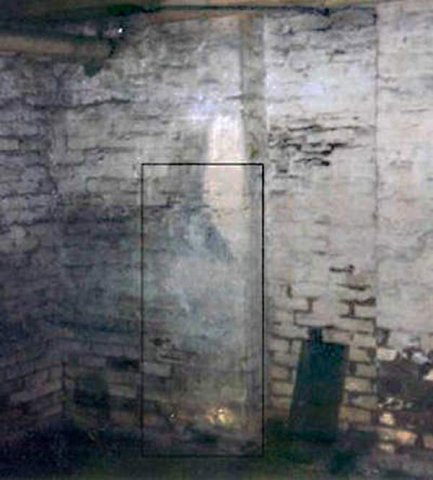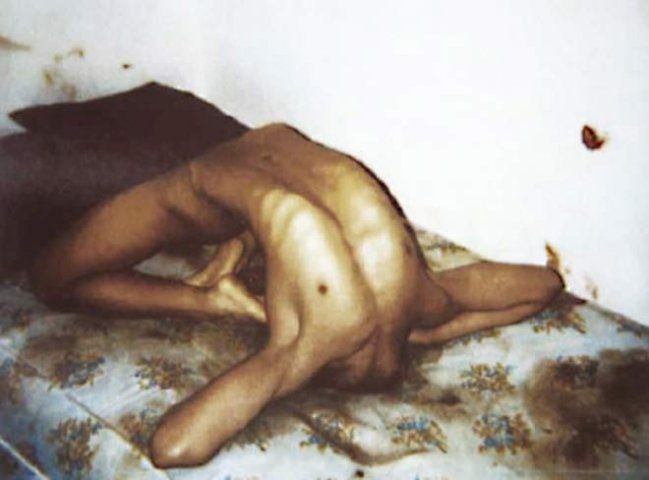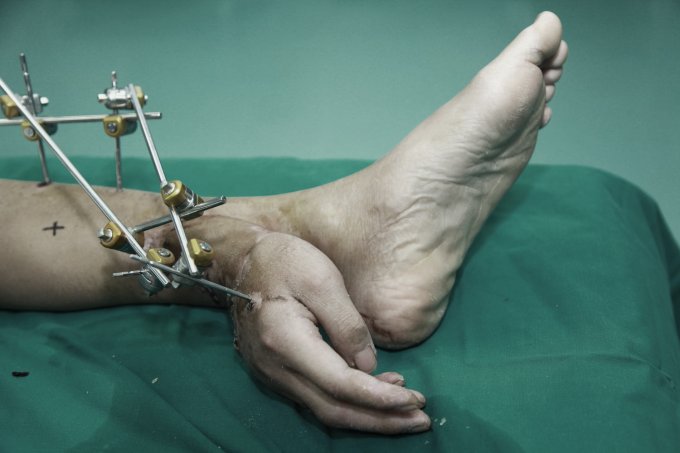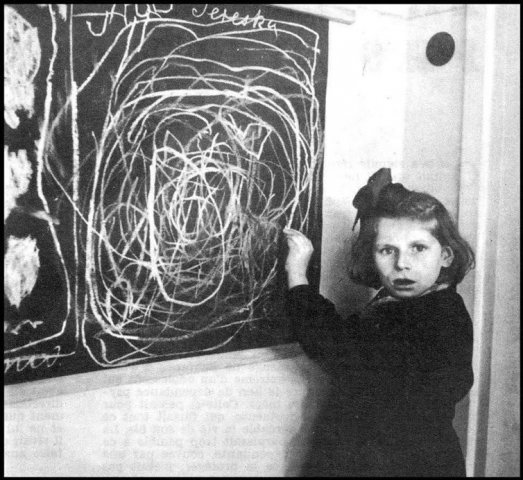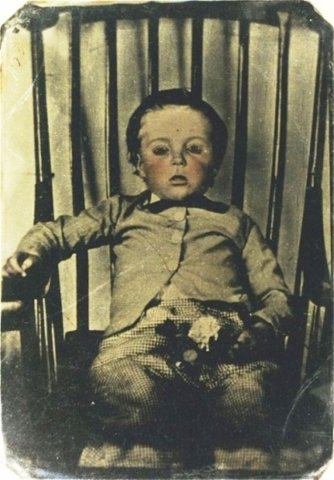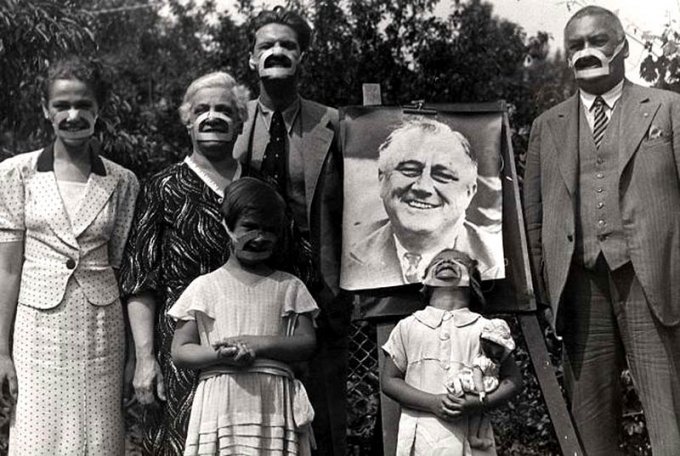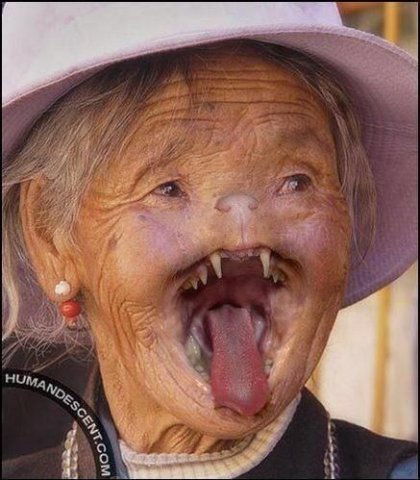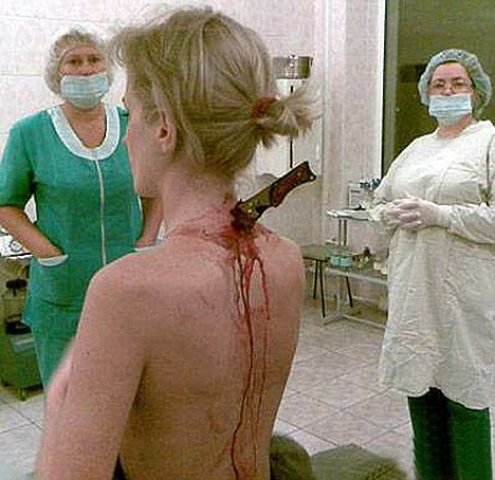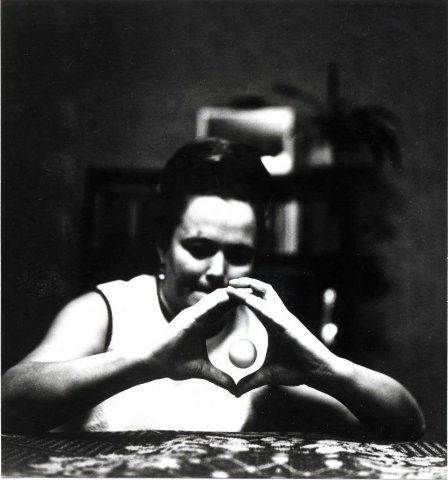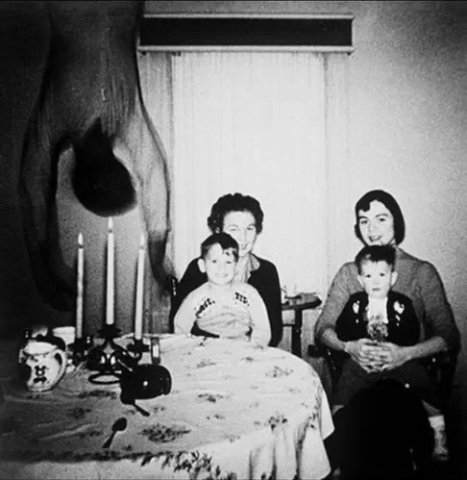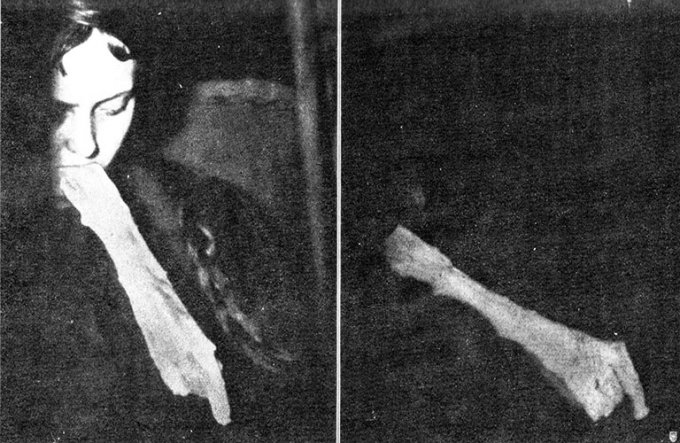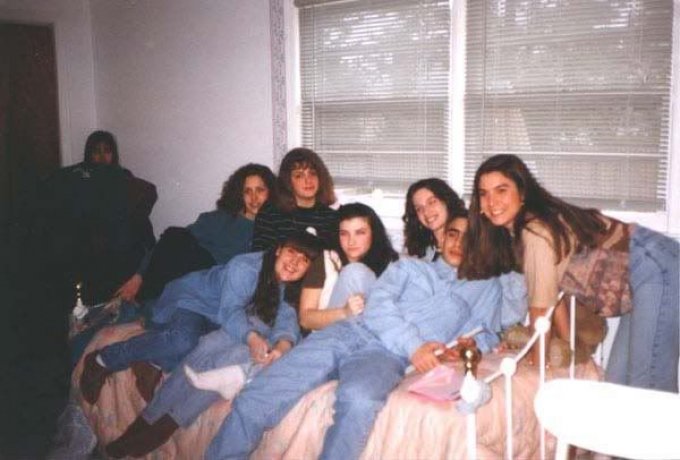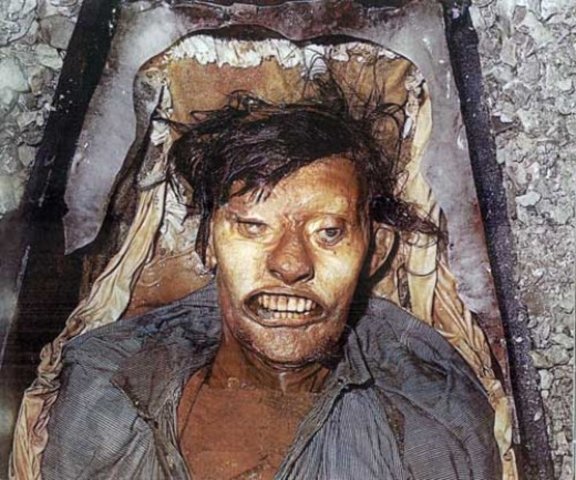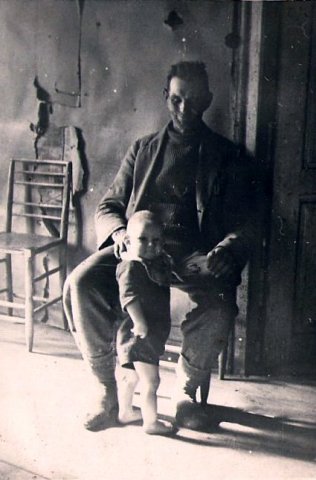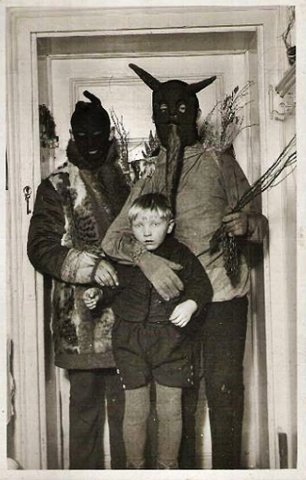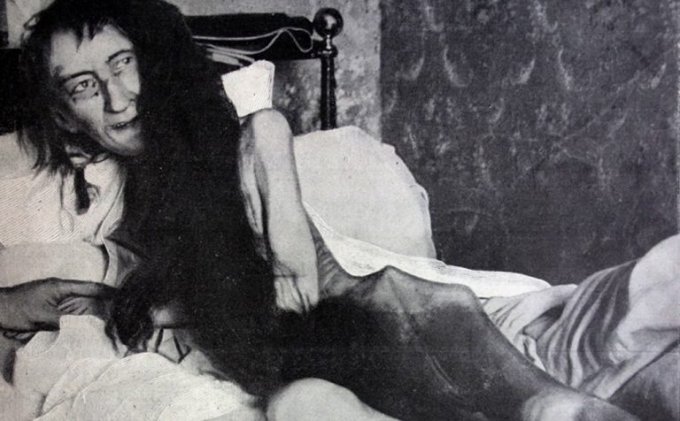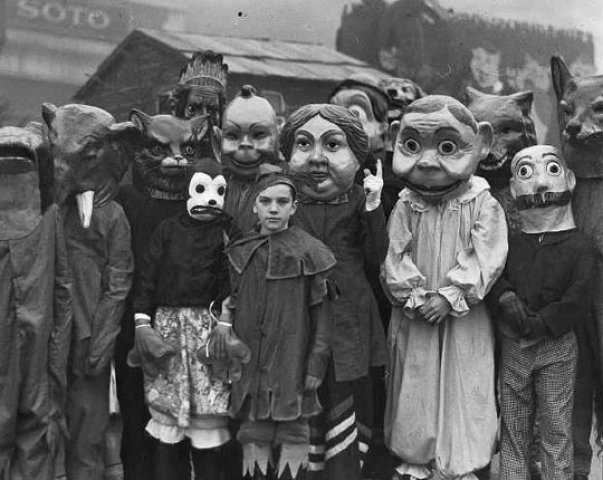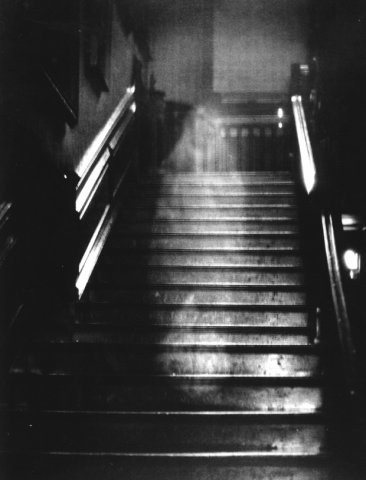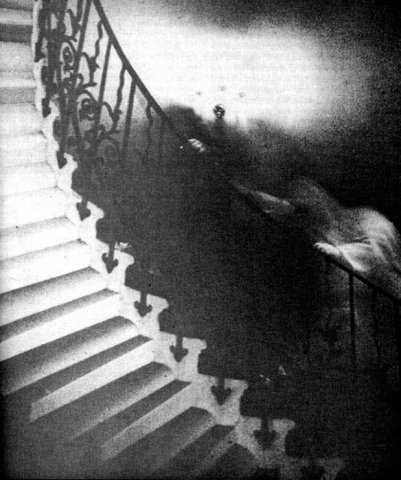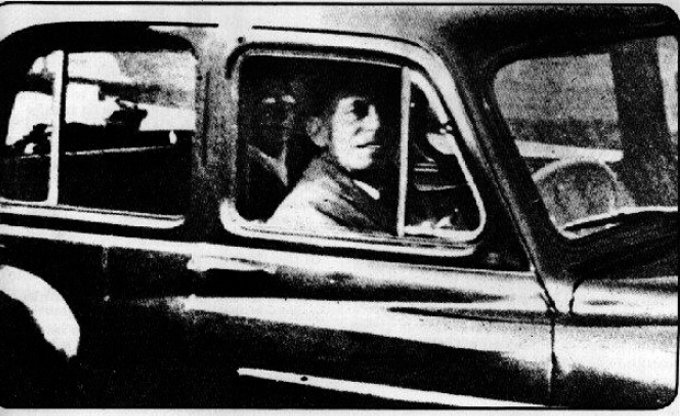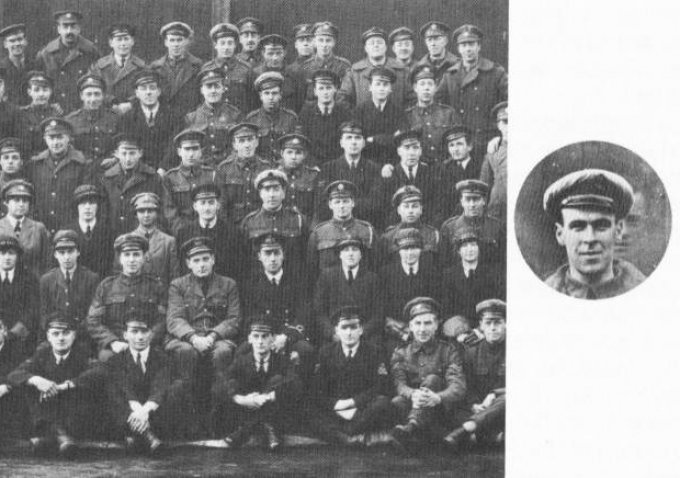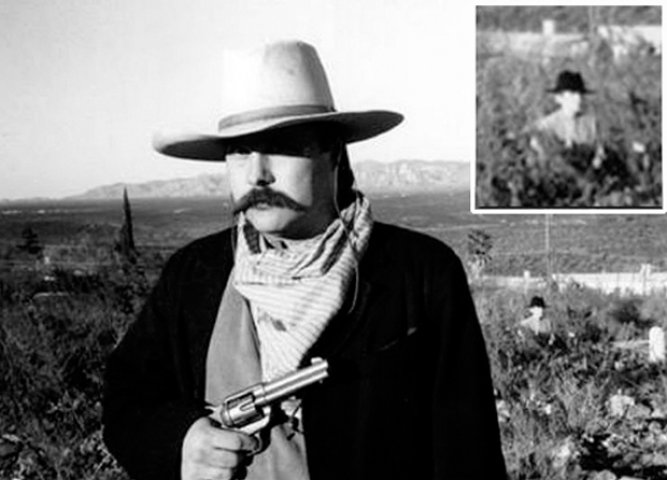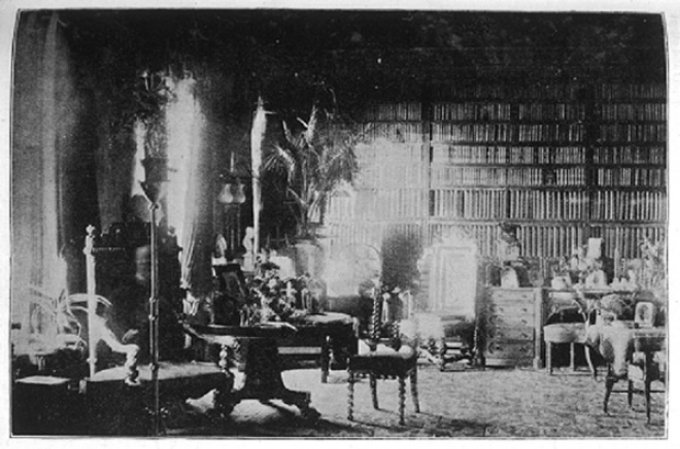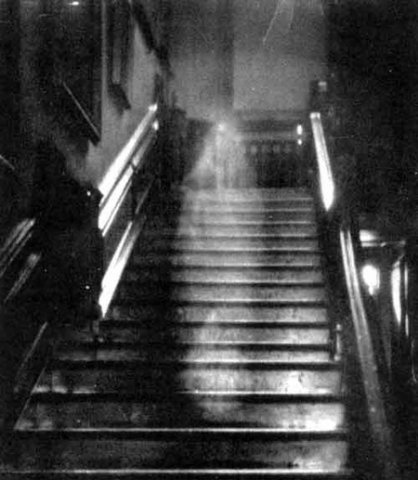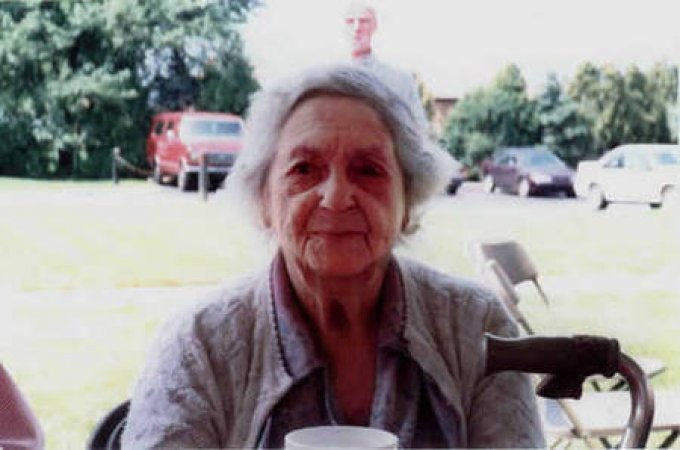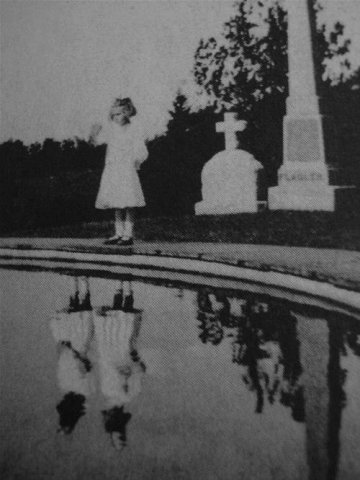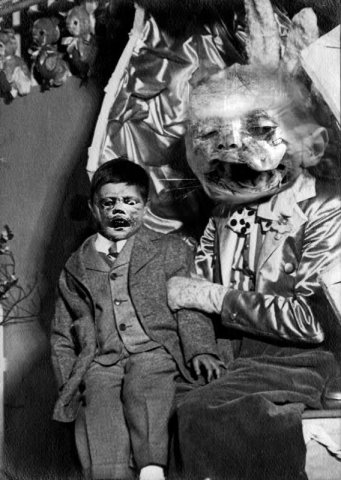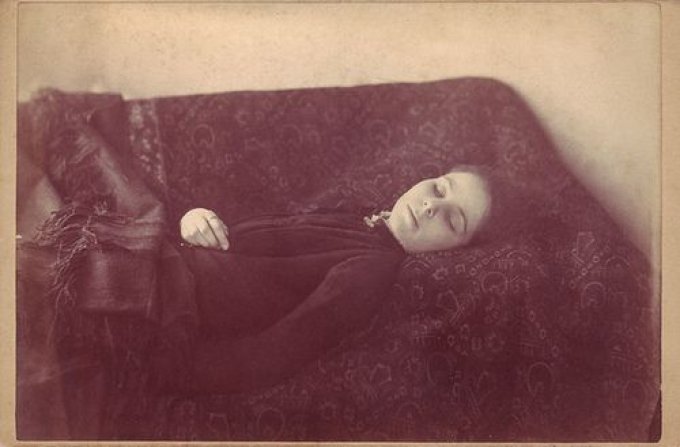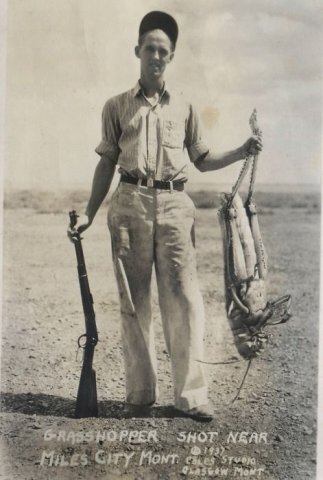Primary tabs
SCARING PICTURES SLIDESHOW
Picture taken by the killer of Regina Kay Walters before her murder.
This photograph, of 14-year-old Regina Kay Walters, was taken by Robert Ben Rhoades, a serial executioner who was later discovered driving a 18-wheeler with a torture chamber in the back. Rhodes took the photograph in the wake of trimming Walters' hair and making her wear a dress and foot rear areas, he at that point slaughtered her in a relinquished outbuilding in Illinois.
Associated Press photographer Paulo Duarte took the soccer photo of the decade — if such a category exists. Duarte caught what appears to be a ghost celebrating a goal in the now-famous image, according to 101 Great Goals.
It happened on On Oct. 3, when James Rodriguez scored in the 83rd minute to give FC Porto a 1-0 lead over Paris Saint-Germain (PSG) in the UEFA Champions League. A delighted Rodriguez was running toward a teammate to celebrate when Duarte snapped the picture. The image hasn’t been altered in any way, and the original photo can be seen on the AP’s photo archive.
“The photo was taken by an AP photographer [Duarte] at the match, and it appears to show a silhouette of a man looking like he comes from another era, wearing clothes and a haircut from the mid 1900s,” the report says. “According to the experts, it would only have been possible to catch this image with a professional camera and the supposed ghost is too clear for it to be a blur or lighting issue.”In 1942, a photographer for the Buffalo Courier Express, I. Russel Sorgi, was sent out on assignment when he captured this photograph. After deciding not to follow his usual route, Sorgi was led to Genesee Hotel by police cars, where a woman was sitting on a ledge outside of the eighth-floor window. The woman, Mary Miller, then jumped to her death and Sorgi captured the shot during her fall.
Sadly, this small girl was blinded by the Atomic bomb in Hiroshima in August 1945. Another child, a boy, miraculously survived both the Hiroshima and Nagasaki bombs.
He lived until 93 (2010), when he died of stomach cancer. Both people are testaments to human resiliency.
A 17-year-old young lady dove 30 feet to her passing as she climbed onto a railroad connect - to take a selfie.
Young person Xenia Ignatyeva was multi month shy of her eighteenth birthday celebration when she fell, and was hit by 1,500 volts as she was shocked when she endeavored to snatch live wires.
Specialists have cautioned individuals are progressively putting themselves in danger as they endeavor to take more breathtaking and unsafe self representations to exceed others on informal communication stages.
Xenia was a sharp novice photographic artist and her huge energy had been taking pictures of herself with a camera she purchased toward the finish of 2013 after a late spring activity.
However, her life was stopped when she chose that the highest point of the rail connect in Krasnogvardeysky, in the Russian city of Saint Petersburg, would make an incredible area for one of her photos.
Lamenting grandma Olga stated: "The police said she needed to take a snap of herself during the evening, to give it the most emotional impact and with the railroad line as a background.
"She was taking it herself so she went up there without anyone else, a sweetheart was holding up beneath."
Be that as it may, by one means or another the young person lost her adjust, and toppled off the side of the scaffold.
As she fell, she frantically endeavored to get the high voltage link and shocked herself before her body dropped onto the solid beneath.
Police, alarmed by an unknown call saying youngsters had been playing on the extension, fear Xenia may at present have been alive for a brief timeframe after she hit the ground.
Buddy Oksana Zhankova, likewise 17, who had held up underneath, is said to have been deadened by stun.
She raced to her companion's side and was discovered hunkered close to her body when crisis administrations arrived.
Prepare tracks far and wide have turned into a magnet for adolescents searching for energizing selfies.
In 1975, Diane and Peter Berthelot alongside their 12-year-old child went to the Worstead Church. Diminish snapped a photo of his better half asking peacefully on one of the congregation seats. After improvement, off base, a companion of Mrs. Berthelot was stunned to see a white shadowy figure sitting directly behind her and pointed it out. The figure in the photograph seems, by all accounts, to be wearing light-hued, out-dated garments and a hood. The accompanying summer, The Berthelots would return back to the Worstead Church with the photograph and ask about it with Reverend Pettit, who happened to be the congregation vicar. He educated them concerning the legend of the White Lady who is known to be a healer showing up close somebody who required recuperating. Diane all of a sudden understood that the time the photo was taken, she was very sick and taking solid anti-infection agents. The phantom of the White Lady goes back well more than 100 years. As indicated by one story, on Christmas Eve of 1830 a man gloated a test to the White Lady. He said he would move to the highest point of the congregation's spire and kiss her on the off chance that she would show up. So up he went. When he neglected to return after a period, be that as it may, companions went to look for him. They discovered him in the tower, cringing in a corner, startled. "I've seen her," he let them know, "I've seen her… ." And then he passed on.
An American religious organization under the leadership of Jim Jones, in northwestern Guyana.
A total of 909 Americans died in Jonestown, all but two from apparent cyanide poisoning, in an event termed “revolutionary suicide”.
“We committed revolutionary suicide protesting the conditions of an inhumane world.” With these words Jim Jones and more than 900 of his followers died in Guyana on November 18, 1978. Despite his rhetoric, the world does not remember Jim Jones and the demise of Jonestown as the noble and courageous act of a group of idealists committed to social justice in an unjust world. In fact, just the opposite is true. Jones is remembered as a power-obsessed maniac who, knowing his game was up, took everyone he could with him in a final act of grandiose and pointless insanity.
This is the Buckley Family. The children’s names were Susan and John. As a Halloween joke, the kids in the neighborhood were going to get a dummy and pretend to chop its head off.
The Buckley children thought it would be hilarious to actually kill their mother, so when the kids walked up the door they got an axe and slaughtered her. Once everyone figured out what they had done, they called the police, but the kids were long gone by then.
The only picture of them was this photo, taken by a trick or treater. The mother's body was found half eaten.
Before the shooting, Harris and Klebold, matured 18 and 17, made home recordings alluding to what they would do and apologizing to their parents for it. On April 20, 1999, at around 11.29 AM, they carried bombs and firearms and opened fire inside Columbine High School.
They murdered 13 people, twelve of them understudies and one teacher, and injured 23 others. At that point, they killed themselves in the school's library at roughly 12.08 PM by shooting themselves in the head.
Eric Harris
Harris was born in Wichita, Kansas. The Harris family relocated often, as Eric's father, Wayne Harris, was a U.S. Air Force transport pilot. His mother, Katherine Ann Poole, was a homemaker. The family moved from Plattsburgh, New York, to Littleton, Colorado, in July 1993, when Wayne Harris retired from military service.The Harris family lived in rented accommodations for the first three years that they lived in the Littleton area. During this time, Eric met Dylan Klebold. In 1996, the Harris family purchased a house south of Columbine High School. Eric's older brother, Kevin, attended college at the University of Colorado Boulder.
Dylan Klebold
Klebold was born in Lakewood, Colorado, to Thomas and Susan Klebold. His parents were pacifists and attended a Lutheran church with their children. Both Dylan and his older brother, Byron, attended confirmation classes in accordance with the Lutheran tradition. As had been the case with his older brother, Dylan was named after a renowned poet – in Dylan's case, the playwright Dylan Thomas.At the family home, the Klebolds also observed some rituals in keeping with Klebold's maternal grandfather's Jewish heritage. Klebold attended Normandy Elementary in Littleton, Colorado for the first two grades before transferring to Governor's Ranch Elementary and became part of the CHIPS ("Challenging High Intellectual Potential Students") program. He found the transition to Ken Caryl Middle School difficult.
The photo is of a man named Brian Peppers when he was 34 and he was recorded in Ohio's Electronic Sex Offender Registration and Notification framework because of a conviction for Gross Sexual Imposition in 1998, in Lucas County, Ohio. His appearance may have been expected to either Apert Syndrome or Crouzon Syndrome. He was wheelchair-bound when the photo was taken, which clarifies the presence of short stature. He was condemned to 30 days in prison and 5-year probation for "unwilling sexual contact with one who isn't one's life partner".
Several other accounts were also given about how Brian Peppers came into existence. One of such accounts had it that he was a product of incest as his mother was impregnated by her own brother. Brian Peppers was born deformed. He had Apert Syndrome, a certain genetic disorder characterized by a premature fusion of skull bones which affects the shape of the head and face as well as prevents the skull from growing normally. Peppers’ deformities reportedly led to his parents abandoning him at a young woman’s doorstep. The woman had bad eyesight and thus couldn’t say for sure how the little baby looked like but she took proper care of him by her own self.
Peppers was eventually enrolled in a school but his mental issues made comprehension quite difficult. His classmates were not helpful also. While some hated and bullied him, others were scared of him. As he continued to grow, he became more unintelligent and weaker. Worst of it all was that he never had friends, ladies ran away from him and to console himself, he picked up bad habits like masturbating in the public and molesting barnyard animals just to put his sexual desires to rest.
Disturbingly Odd People from the Past with Haunted Baby getting Drowned in the Water.

Her feet were no less than 17 inches long; her name was Fannie Mills. The petite lady weighed 52.27kg and wore estimate 30 shoes of the age, produced using three goat skins, and pillowcases utilized as socks.
"The Ohio Big Foot Girl" was conceived in Sussex, England either in 1859 or 1860 to English transients who settled close Sandusky, Ohio.
Fannie had a condition known as Milroy Disease, which made her feet develop to an anomalous extensive size. The family trusted her ailment came about because of a "maternal impression" when Mr. Factories, her dad, made the pregnant Mrs. Factories wash the swelled leg of a stallion.
Her profession started in 1885, when she entered the exhibition hall circuit, joined by a medical attendant, Mary Brown. After the offer of $5000 and a "very much supplied cultivate" to anybody willing to wed the huge footed young lady, she in the long run wedded Mary's sibling, William Brown.
46-year old William married 26-year old Fannie in late 1886 and by August 1887 Fannie was conveyed of her stillborn youngster.

Noelle Baynham's dogs started to eat her remains after being locked in the house for days.
The most likely cause of death was an accidental overdose, an inquest was toldHowever a doctor could not decide/figure out the exact cause of death because the dogs, who were trapped in the house, ate parts of her.
Concerned friend Grant Donovan made the 'horrific' discovery of her remains after nobody answered the front door at her home.
He told the legal investigation that he could hear her two dogs barking and jumping behind the door and became concerned that there did not appear to be anyone in with them.Finding the back door unlocked, he entered the house where he said the floors were covered in dog (brown, smelly waste from animals).
Walking through, he then discovered Ms Baynham's body lying on the landing.
'This was the most truly shocking and terrible thing I have ever seen,' he told the legal investigation.
'I could not look at her long, so I just came away and called 999.'
Detectives who searched the house following the terrible discovery, on January 17 this year, could find no event(s) or object(s) that prove something of a struggle or foul play.
The hearing was told how former jeweller Ms Baynham was found was in her dressing gown and had run a bath just before her death.
Detective Police officer Wesley Arnold from Hampshire Police told the coroner that scratch marks on her chest pointed to/showed that her dogs may have tried to wake her after she collapsed.
Home Office Dr Amanda Jeffery reaveled that she had probably died 'a few days' before she was found, but because the dogs had eaten her organs it was impossible to establish exactly what had killed her.
NoelleThe 'combined effect' of a variety of drugs found in her system was likely to have been the cause of a (happening by chance, without any planning) overdose, she added.
The hearing was told that Ms Baynham suffered from (mental disorder where people switch from very happy to very sad) and long-lasting alcoholism and was prescribed a variety of medicine. Blood tests found a range of drugs in her system including possibly poisonous levels of painkillers.
Recording an open legal decision, senior central Hampshire coroner Grahame Short ruled that there was no objecs of suicide or a (happening by chance, without any planning) fall, but said Ms Baynham may have had a stroke.
'The shocking and truly terrible element in this case is what happened after death rather than before, and it's completely reasonable that when there are dogs in the house with no one to care for them, that they will then start to eat her remains.
'That clearly was a major interference to Dr Jeffery in her examination, and as she's explained, she was not able to look at her important organs and she could not establish a clear cause of death.
'I have to say there's no sign to say this was a carefully planned overdose. There can come a point where [the drug level over time is] just too high and one pill too many can tip over the balance.'
The dogs were (after that) put down on the opinions about what could or should be done about a situation of police officers.Necrotizing fasciitis is an infection / inflammatio. it's rarely produced by bacteria that destroys the skin and soft tissues beneath it -including fats and muscles-.
Because of these infections people often dies quickly, a person with necrotizing fasciitis is sometimes -Sometimes said of infection / spread the bacteria "eat meat", in particular Streptococcus pyogenes.
Fascitis necrotizing is very rare but really serious. in approximately 30% of those who develop necrotizing fasciitis they die.
January 27, 1993, the head of a female was found in Wayne Fitzgerald State Park in Jefferson County, Illinois.
Postmortem examination revealed the victim had reddish-brown hair. Analysis by the University of Illinois, Anthropology Department indicated the victim's age ranged between 30 to 50 years.
Unusual skeletal characteristics of the skull and upper front cervical vertebrae indicate the victim suffered from chronic spasmodic torticollis or wryneck, a condition which causes stress on the muscles which are responsible for maintaining upright head posture. Evidence of a healed traumatic lesion on the skull suggests this condition may have been preceded by head trauma; this would have resulted in the victim maintaining a leftward tilt of the head.from the police departement
Contact Information:Anyone with any information that would help identify this unidentified victim is urged to contact Jefferson County Sheriff's Department at 618/242-2141 or Illinois State Police, M/Sgt Myron Pansing at 618-542-1137.The woman was allegedly trying to split burgers apart, her knife slipped and stabbed her hand.
Judging by her outfit, she was probably a Wendy’s employee.
Long blade on that knife, but she probably missed all the tendons so she’ll likeky regain full sensitivity of her hand after the cut has healed.So... Are you scared of flying?
seriously?
When i fly sometimes i like to check the engine from the window, you know, just to check if everything is fine.
This is most likely the last thing you would want to see looking out the window of the plane you are flying on…
talk about freaking out.
This is really HORRORIFIC!
Sometimes is Better not to turn back!
Whatch these five girls having fan together and... Somebody is hiding behind them.
Who is him? a Stalker, a psycho maniac? a ghost? a serialkiller?
Somebody found this really creepy picture on the web and we don't actually know what happened later and if those girls are still alive.
In the 1980s, a family bought a home in Parkersburg, West Virginia. The father took photos of the interior of the house, including the basement. When the photos were developed, he was shocked to see the ghostly image of a young girl in a white dress. She seemed to have her hands folded neatly in front of her.
The family decided to investigate the history of their home and discovered that the house was built in the 1870s by Dr. Charles Bartlett and his wife, Margaret. The Bartletts had several young children, including a daughter named Bessie. Dr. Bartlett was a successful dentist, and ran his practice out of the family home. Unfortunately, a typhoid epidemic swept through Parkersburg in 1879, and Bessie, who was around 10 at the time, caught the disease.
Dr. Bartlett was at a loss of what to do. He knew that if anyone found out that Bessie was ill, the home and the family would be quarantined, and his business would be ruined. He also couldn’t bear the thought of sending his daughter away to a hospital, left alone to be cared for by strangers.
In a desperate decision, Dr. Bartlett arranged for the basement of the home to be turned into a hidden sickroom for Bessie. He had hoped the cool air of the basement would help break her fever, and that her recovery would be much swifter if she were cared for by family members.
However, Bessie eventually succumbed to the fever and was found dead in the basement. She was buried in the family plot in Odd Fellows Cemetery, off of Murdoch Avenue in Parkersburg.

On July 22, 1991, two police officers walked into the flat of Jeffrey Dahmer, only to discover one of the most horrific crime scenes in history.
Dahmer had used his flat, Apartment 213, 924 North 25th Street, Milwaukee to commit crimes so disturbing he will go down in history as one of the world's most disgusting, depraved serial killers that has ever lived.
Body parts, skeletons, shrines and photographs were found that proved Jeffrey's despicable crimes. 16 men were tortured, murdered, dissected and stored in his tiny apartment.
He even had sex with the corpses of some his victims, twisting their bodies into peculiar positions for his own sexual gratification. Oh, and he also stored the body parts so he could eat them, nice.
Xiao Wei lost his right hand in an accident at work but could not have it reattached to his arm right away.
Instead, the hand was kept alive by stitching it to Mr Wei's left ankle and "borrowing" a blood supply from arteries in the leg.A month later, surgeons were able to remove the hand and replant it back on his arm, according to Rex Features.
According to the report, Mr Wei's doctors from the Changsha region say he will need to undergo several other operations but they are hopeful that he will regain full function of his hand.
"His injury was severe. Besides ripping injuries, his arm was also flattened.
"We had to clear and treat his injuries before taking on the hand reattachment surgery."The hand remained grafted onto the ankle for a month before surgeons could attempt reattaching it to Mr Wei's injured arm
Mr Cairian Healy of the Royal College of Surgeons in England said although procedures such as these were rare, they were not inconceivable.
"The Chinese are pretty experienced in microsurgery," he said.
"And the concept of saving a severed part of the body by attaching it to another part of the body to give it a blood supply is well recognised.
"The ankle is a hard place to graft though. Usually surgeons would go for the armpit because the blood supply is better."
He said there were many reasons why a surgeon might not want or be able to reattach a hand to its rightful home straightaway.
"The patient might not be fit enough for the surgery. It can take a skilled surgeon between eight and 15 hours to reattach a hand."
The vital factor is keeping the hand alive.
On ice, it may survive slightly longer, but Mr Healy said few surgeons would contemplate replanting a hand that had been detached for more than a few hours because the muscle inside it would be dead.
He said that, sadly, not all replantations are a success. Some patients do not like the end result and may later opt for amputation because of side-effects, such as pain and stiffness.
RICHMOND, Va. — Kevin and Christiana Dennis are from Chester and were married at the Mormon Temple outside of Washington, D.C. in December. Kevin Dennis later uploaded the photo of he and his wife on their wedding day to reddit. The photo seems to show a ghostly face in between them. Originally it was their favorite wedding photo until they spotted something really creepy seemingly lurking behind them. The couple spoke to WTVR CBS 6 reporter Melissa Hipolit by Skype, and explained how they had just gotten their wedding photos back when they spotted someone, or something, they didn’t recognize behind them in their favorite photo.
Kevin wrote that the couple didn’t notice the ghostly image at first and it wasn’t until his wife made it her Facebook profile picture that a friend pointed it out. The couple said they have no idea if it was one of their guests.
A girl who grew up in a concentration camp was asked to draw “home” and what she drew was scribbles. It shows how the horrors of the concentration camp warped her mind. It’s a mystery what the lines truly mean to her, probably the chaos or the barbed wire.
This photograph was taken by Chim (David Seymour) in a home for emotionally disturbed children located in Warsaw, 1948. There are a few versions of this image, but most of the captions (including one at the War/Photography Exhibit currently on view at the Brooklyn Museum) mention that the subject grew up inside a concentration camp. There’s little information about the girl’s identity, her name was Tereszka, a diminutive version of Teresa. Her eyes are piercing, like a window to her soul. Not the eyes of an innocent youth. She’s probably experienced horrors at that age most will fortunately never have to. Like the soldiers who have seen heavy combat, she’s got the terrifyingly haunting one thousand yard stare.
Most children who survived the Holocaust emerged from hiding places
attics and cellars, caves and forests, convents and monasteries, and homes ranging from huts to castles. When the war in Europe ended in May 1945, more than 1 million and perhaps as many as 1.5 million Jewish children were dead, targeted victims in the Nazis’ calculated program of genocide. Of the estimated 216,000 Jewish youngsters deported to Auschwitz, only 6,700 teenagers were selected for forced labor; nearly all the others were sent directly to the gas chambers. When the camp was liberated on January 27, 1945, Soviet troops found just 451 Jewish children among the 9,000 surviving prisoners.
Liberation for children was not necessarily liberating. Mostly, parents did not come for them. Children waited for years until hope too had died. The youngest survivors did not know their names, country of origin, or even their first language. The older ones faced untold hardships and, for most, 3-5 years more passed before they had found a home. Children were swept up from Europe and resettled in England and Israel, the United States and Canada, Australia and South Africa. Their experiences were very different from the older survivors. Generally speaking, those under age 16 or 17, by war’s end, were taken in by foster families, returned to school, and discouraged to speak of the past.
This is one of the most famous creepy pictures around the web lately.
This picture was taken via smart phone. The little girl that you can see crying in the bottom right corner refused to join the group because she said:
"The little boy is scaring me!"
Thinking nothing of the trantrum, the mother of the little girl discovered later what the girl was crying about... when she looked at the knee-level of the group in the picture.
Bloody creepy!

After the invention of daguerrotype, the memorializing habits of people have changed: they've chosen the cheap, higher quality photographs instead of expensive and not so lifelike paintings.
Painting dead people was common for centuries
so it's no surprise that, in the Victorian Era, post-mortem photos also came into fashion. Here are some of the strangest ones.
Because of the high childhood and infant mortality rate
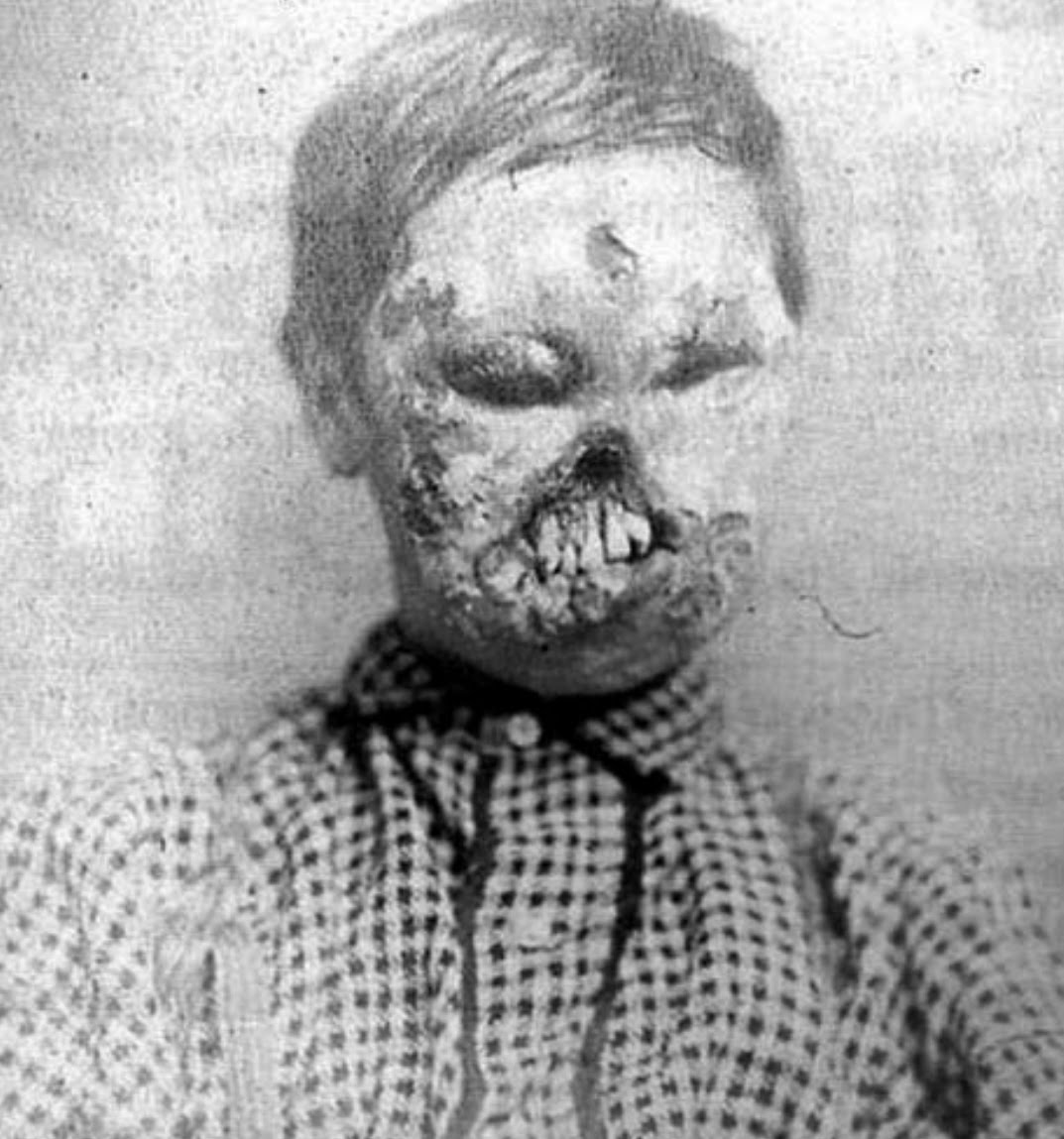
this was a significant way to memorializing lost family members. In some cases, this was the only photograph that depicted the entire family together.
A tragic suicide epidemic gripped Budapest, Hungary in the wake of World War I — and some believed it was all caused by a popular song. Even weirder than this idea, though, was how the city tried to combat the suicide problem with a "Smile Club."
On 17th October, 1937, the Sunday Times Perth explained the Budapest suicide problem:
Although a magnet for tourists from all over the world, Budapest has for several years been known to its own people as The City of Suicides. Budapest suffered badly after the war and has received unpleasant publicity from the number of cases of self-destruction occurring every year within its boundaries. Some of them are alleged to have been inspired by the Budapest song, "Gloomy Sunday", but be that as it may, the suicide rate in Budapest is definitely high. The favorite method adopted by most Budapest melancholics in drowning, and patrol boats are stationed along the boundary near the bridges to rescue citizens who seek consolation in the dark waters of the Danube.
The paper added that people in Budapest were combatting the problem by learning to smile better:Now, however, a "Smile Club" has been inaugurated to counteract the suicide craze it was originally begun more as a joke by Professor Jeno and a hypnotist named Binczo, but somehow it caught on. The organisers have now a regular school and guarantee to teach the Roosevelt smile, the Mona Liza smile, the Clark Gable smile, the Dick Powell smile, the Loretta Young Smile, and various other types, the rates varying according to the difficulties encountered.
Jeno says the methods employed at his school, aided by better business conditions in Budapest are making smiling popular and before long it is hoped that the name of Budapest will be changed to the City of Smiles.
The song Gloomy Sunday (also known as the Hungarian Suicide Song), mentioned above, was composed by Rezső Seress and published in 1933. It became well-known after Billie Holiday covered it eight years later.There have been several urban legends regarding Gloomy Sunday, because the number of Hungarian suicides peaked in the 1930s and press reports linked them to the song. There were also stories about radio networks banning the song, but only BBC did it with the Billie Holiday version in 1941, which was "detrimental to wartime morale." Here is the original version:
The following photos of the Smile Club efforts were published in a Dutch illustrated magazine Het Leven, in 1937. The whole thing looks terrifying — especially the strange medical tape that people used to create their smiles.
This is most scary picture I saw. This lady almost does not have nose and teeth. Her teeths are like vampire.
A video of a woman on a train, believed to be possessed by the devil, is getting a lot of attention in the social media. In the clip, you will notice that after the woman checked her cellphone, she started acting weird and suddenly attacked a fellow passenger seated just a few inches from her.
The film showed how she grabbed the man’s throat and punched him with her other arm. The startled man immediately pushed her away.They fought each other before she released him and went to the door of the train as if nothing happened.
In the succeeding scenes, the man, obviously provoked by what happened, followed and grabbed her. They wrestled until the train guards came and dealt with them.
According to reports, they were fined $500 for fighting in public
The incident happened inside the Edmonton Transit System (ETS) in Alberta, Canada
An extraordinary picture that has gone around the world of a knife plunged into the back of a woman mugging victim is genuine, it was revealed by doctors in Moscow tonight.
Julia Popova, 22, was stabbed by a mugger as she walked home from work one day last autumn - but she was so traumatised by the attack that she walked home without realising the knife was embedded in her, just a fraction of an inch from her spinal cord.
In the image, blood is shown gushing from the wound as surgeons stare in awe, apparently preparing to operate to remove the six-inch blade. This is our photo, she was here,' a senior doctor at the hospital in the north of the Russian capital told the MailOnline last night.
Other medics also confirmed the case. They declined to be named as they were not directly involved in the patient's treatment.The low quality of the image, which was published in British newspapers today, led to speculation it was faked - especially since it first appeared in a brash Moscow tabloid newspaper and on a website widely believed by locals to run stories of doubtful authenticity.
The senior surgeon at the hospital would not confirm Julia's name to protect her privacy. But he said: 'The case was last autumn. She spent about 40 minutes walking home after she was attacked.' Despite the length of the blade, he said, it missed her spinal cord and major arteries in her neck.
'The knife was stuck in her bone,' he said. 'It's an absolutely unique and extraordinary case. She was so lucky. The only thing damaged was the bone.'
Julia only realised something was wrong when she arrived home and her parents saw what had happened. An ambulance was at the house within 15 minutes - meaning the woman spent over an hour with the blade in her back before she was seen by doctors. It was on her arrival at the hospital that the image was taken. The surgeon confirmed the picture had been taken by medics - but he could not say how it fell into the hands of the Russian newspaper Tvoi Den. The doctors, he said, operated immediately to remove the knife.
It is believed that Julia spent ten days in the hospital after the operation. 'She had a straightforward recovery,' the surgeon said - suffering no long-term effects from the horrific attack.
The most famous medium ever seen
From the 1960s to 1990 Russian 'psychic' Nina Kulagina displayed an apparently impressive range of psychic powers, particularly psychokinesis (the ability to move objects using the mind alone), and was tested and supposedly found to be genuine by respected scientists. She was also filmed using her abilities many times. However, she remains a controversial figure and her demonstrations of psychic ability have received criticism from sceptics who believe the films and experiments show clever trickery rather than paranormal powers. This would, at present, seem to be the most likely explanation.
Kulagina was only 14 when the Nazis began the siege of Leningrad. Like many Leningrad children she had to become a soldier, and along with her father, brother and sister, she joined the Red Army and was sent into the thick of the action. The conditions during the 900 day siege were appalling. Winter temperature sometimes reached forty degrees below zero, bread rations were about four ounces a day, the water and the electricity were cut off, and the city was devastated by bombs and artillery fire. Nina served on the front line in Tank T-34 as a radio operator, and distinguished herself enough to become senior sergeant. But the fighting came to an end for her when she was seriously injured by artillery fire. Fortunately, she managed to recover and later settled down, married and had a son.
Powers of the Mind
Nina claimed that she was always aware of her 'psychic powers'. There are stories that she could mentally see things inside people's pockets, and when she met sick people she could identify the disease they were suffering from, an image of the illness appearing in her mind. On one occasion when Kulagina was in a particularly angry mood, she was walking towards a cupboard in her apartment when a jug in the cupboard suddenly moved to the edge of the shelf, fell and smashed to pieces on the floor. After that, changes began to take place in her apartment. Lights went on and off; objects became animated and seemed somehow to be attracted to her. It was in effect a type of poltergeist activity, except that Kulagina was convinced the psychic power was coming from her and discovered that, if she tried, she could control it.
In 1964, while in hospital recovering from a nervous breakdown, Nina spent a lot of time sewing. According to published accounts doctors were amazed when they saw that she was able to reach into her sewing basket and choose any colour of thread she needed without looking at it. Local parapsychologists were contacted and the following year, when she had fully recovered, she agreed to take part in various experiments. Kulagina was tested and it was found that she could apparently 'see' colours with her fingertips, bringing to mind Rosa Kuleshova, a school teacher from the Ural Mountains, who also claimed to possess this talent.
There are also instances where Kulagina apparently displayed extraordinary healing powers. She could, it was said, make wounds heal up simply by holding her hand above them. She was also tested by Russian scientists for psychokinesis and the results were apparently so remarkable that, in order to keep her real identity secret, she was obliged for many years to use the pseudonym of Nelya Mikhailova. What these remarkable results were, however, has never been exactly stated.
Telekinesis
One of Kulagina's abilities involved her sitting at a table and staring at a small object, such as a matchbox or a wineglass, and make it move without touching it. Apparently her powers did not come straight away, hours of preparation may be needed, which, as sceptics have pointed out, does not favour the setting up of strictly supervised demonstrations. In order to move things with mind power alone she found she had to clear all other thoughts from her head, and told investigators that when her concentration was successful, there was a sharp pain in her spine, and her eyesight blurred. Nina practiced hard, focusing her powers, and was soon able to move matchsticks, fountain pens and compass needles. There is nothing here, however, which an accomplished stage magician could not duplicate, though no one at the time in Russia seems to have bothered to try.
One of the first scientists to take an interest in Kulagina was Biologist Edward Naumov. In an early test, the details of which are as usual sketchy, he scattered a box of matches on a bench; Nina held her hands over them, trembling with the strain. Suddenly, all the matches moved together to the edge of the bench, then fell one by one to the floor.
Psychic Powers on Film
Amazing stories about Nina Kulagina began to reach the West through the international wire services in the spring of 1968. In the same year, films of Kulagina moving objects, ostensibly using only her mind, were shown at the First Moscow International Conference on Parapsychology and were also seen by some Western scientists. For a brief time Western investigators were permitted to meet Russian mediums, witness Nina Kulagina for themselves and verify the reports of her PK abilities made by Soviet scientists. In 1970 William A. McGary, one of a group from the United States investigating psychic phenomena in Russia, described a session in which Kulagina caused several small objects, including a wedding ring and the top of a condiment bottle, to move across a dining-room table.
Another of the American investigators, Gaither Pratt, of the University of Virginia, stated that the objects which Kulagina could move varied widely in material, shape and weight, and when they moved they generally progressed in a slow, steady fashion. Only occasionally did the objects which Kulagina 'controlled' move in fits and starts. It is reported that a number of precautions were taken to make sure that Kulagina wasn't using a concealed magnet or threads, and films were taken of the experiments which seem to confirm that no known force could explain the movements. Unfortunately, it is not known how thoroughly Kulagina was checked before the experiment.
Dr. Zdenek Rejdak, a prominent Czech scientist connected with a Prague Military Institute, tested Kulagina personally and reported the results for some reason in Czech Pravda, a far from scientific publication:
I visited the Kulagina family the evening of 26 February, 1968. Mr. Blazek, an editor friend was with me, also a physician, Dr. J.S. Zverev, and Dr. Sergeyev. Her husband, an engineer, was also present. Dr. Zverev gave Mrs. Kulagina a very thorough physical examination. Tests with special instruments failed to show any indication whatever of magnets or any other concealed object. 'We checked the table thoroughly and also asked Mrs. Kulagina frequently to change position at the table. We passed a compass around her body and the chair and table with negative results. I asked her to wash her hands. After concentrating, she turned the compass needle more than ten times, then the entire compass and its case, a matchbox and some twenty matches at once. I placed a cigarette in front of her. She moved that too, at a glance. I shredded it afterwards and there was nothing inside it. In between each set of tests, she was again physically examined by the doctor.
The 'Psychic Powers' of Nina Kulagina
In one filmed Moscow test, set up by a group of 'well known physicists', several non-magnetic objects including matches were placed inside a large Plexiglas cube. The cube was to prevent drafts of air, threads or wires; methods long favoured by sceptics as the means by which Kulagina performed her 'tricks'. Her hands moved a few inches from the Plexiglas cover and the objects danced from side to side in the plastic container. In another filmed experiment, a ping-pong ball is seen levitating and hovering in the air for a few seconds, before falling back onto the table. In yet another she is shown both indoors and outside in a garden, where objects near her spin round or slide in different directions.
Unfortunately the films are so grainy and unclear that it is often difficult to see exactly what is happening, and again the background information to the experiment -- location, precautions taken, personnel present etc -- is not given. Where are the reports of these amazing psychic tests?
An additional and lesser known ability of Kulagina, though hardly less sensational, was noted by physicist Dr. V.F. Shvetz. He claimed that he observed Kulagina making the letters A or O appear on photo paper and that sometimes she could also transfer an outline of a picture she'd seen onto photo paper, recalling the 'thoughtography' talents of the controversial Ted Serios in America. Occasionally, unexplained burn marks appeared on Kulagina's hands and there were reports that shocked scientists saw her clothes catch fire. Towards the end of her life Kulagina demonstrated this phenomenon on TV, causing a bright red patch to appear on the arm of a European journalist.
Testing the Psychic
According to various books (see sources) Doctor Leonid L. Vasiliev, a psychologist at Leningrad University, had pioneered ESP study in Russia at the Institute for Brain Research in Leningrad, and was one of the first to test Kulagina, continuing to do so right up until his death in 1966. Another Soviet scientist, Dr. Genady Sergeyev, apparently a well-known physiologist working in a Leningrad military laboratory, did several years of intensive laboratory research on Kulagina, and made special studies of the electrical potentials in Kulagina's brain. During observations he apparently recorded exceptionally strong voltages and other unusual effects. In one series of experiments in Leningrad, recalling those of Dr. Shvetz, he and his colleagues placed undeveloped photo film in a black envelope. Incredibly, by staring at the envelope Kulagina was able to expose the film inside. If this is incredible story is true, then it is particularly unfortunate that there is no published account of the extraordinary experiment.
Chairman of Theoretical Physics at Moscow University, Dr. Ya. Terletsky declared on 17 March, 1968, in Moscow Pravda: 'Mrs. Kulagina displays a new and unknown form of energy.' The Mendeleyev Institute of Metrology also studied Nina, and announced in Moscow Pravda (why not a science journal?) that she had moved aluminium pipes and matches under stringent test conditions, including surveillance on closed-circuit television. They could not explain how the objects had moved.
"This is the first picture taken in the Cooper's new Texas house, as it was taken, a dead body fell from the ceiling."
this was the original description of the photo.
Possibilities that viewers are suggesting: Double Exposure, Simulacra (what??), Photoshop, Negative Enhancement, a doll hanging in front of the camera, a real ghost trying to scare away the family... or even a living person hanging there just for fun.
what do you think?
it seems genuine to me... and scaring
These excerpts are from the part of Phenomena of Materialisation that presents supplementary work and subsidiary material pertaining to Dr. Von Schrenck Notzing's research and experiences following the publication in 1914 of the first German edition of the book, Materialisations Phaenomene. In the part of the book that was initially published, the reader may compare the photos documenting the materialization (or 'physical') mediumship of Eva. C. (in the following photos seen wearing a black veil with a mesh one-twelfth of an inch wide) with those of Stanislava P. One correlation is shown in the old photo.
There is a broad, thick, rough, and consistent white strand, resembling an arm, the fundamental structure of which, as shown by the enlargement, appears to be granular. No pattern of any organic or technical fabric is to be seen. The exterior surface is partly striped, irregular, and rough. At the end of the mass, which broadens below, there are three quite coarsely designed fingers, one of which, the index, is stretched, while the two others are bent.
Pablo Bartholomew is an acclaimed Indian photojournalist who captured the Bhopal Gas Tragedy into his lens. Twenty-six years have passed since India’s worst industrial catastrophe injured 558,125 people and killed as many as 15,000. Because safety standards and maintenance procedures had been ignored at the Union Carbide India Limited (UCIL) pesticide plant in Bhopal, a leak of methyl isocyanate gas and other chemicals triggered a massive environmental and human disaster. Photographer Pablo Bartholomew rushed to document the catastrophe. He came across a man who was burying a child. This scene was photographed by both Pablo Bartholomew and Raghu Rai, another renowned Indian photojournalist. “This expression was so moving and so powerful to tell the whole story of the tragedy”, said Raghu Rai.
Labeled under Real Ghost Pictures and found in Tremont, Illinois, some construction guys snapped this photo with a camera phone. The story goes that they were hired by the new owners of the home. According to them the lady who lived there had passed away nearly 3 months before. They had been working on the house for 2 days and the house is completely vacant.
It’s strange. Assuming the story is true then this is an amazing piece of evidence but if this is true then in reality this would be blockbuster proof. What do you think about this one?
This picture was taken in 1994 at my cousin's sweet 16 party in Brick, New Jersey.
I have no idea who that girl in the corner is, behind what look like coats, but it wasn't anybody at the party... it's just a freaky image that nobody can explain.
from: Lisa Venezia, USA
John Hartnell, buried alongside Torrington, was also found to be perfectly preserved. What happened to this man?
This image was captured in 2003 during a TV interview, a man was caught committing suicide in the background. Is that true?
An insane man and innocent child
Abducted Child... maybe
The picture is really weird and creepy
Blanche Monnier was kept locked in a Room for 25 years for falling In love with a commoner, her mother did the unthinkable in an attempt to stop it.
The picture shown here looks like a promotional photo for a horror movie, something along the lines of an exorcism film. But sadly, the image is real and the story behind it is much more frightening.
The Monniers were an upper-middle class family living in Poiters, France in the late 1800s, well thought of throughout the neighborhood, even being given the Committee of Good Works award, which honored the most virtuous of citizens. The daughter, Blanche, disappeared when she was 25-years old, arousing no suspicion whatsoever.
An anonymous letter was sent to the Paris Attorney General and read as follows:
“Monsieur Attorney General: I have the honor to inform you of an exceptionally serious occurrence. I speak of a spinster who is locked up in Madame Monnier’s house, half starved, and living on a putrid litter for the past twenty-five years – in a word, in her own filth.”
The police found her locked in a room, covered in filth and excrement, weighing a mere 55 pounds, never having seen the sun in 25 years. Her mother and brother had locked her away to avoid her marriage to a man they deemed unfit to join their family and kept her there for a quarter of a century. Although she did manage to gain a little weight, she never recovered her sanity, and died in a psychiatric hospital 13 years after being freed from her own personal hell.
a really creepy group picture for Halloween
The Brown Lady of Raynham Hall, reportedly haunts the great house in Norfolk, England. This is of the country’s most famous hauntings primarily due to the captured image of the ‘Brown Lady’ on the staircase. The photograph which would become one of the most famous paranormal photographs of all time was taken by photographers from the Country Life magazine that was at Raynham Hall photographing the staircase.
Taken in 1966 by Rev. Ralph Hardy in the Queen’s House section of the National Maritime Museum in Greenwich, England. Hardy, a retired clergyman, intended only to take a picture of the impressive Tulip Staircase but also captured this apparition of a robed figure ascending the stairs.
The original negative was examined by experts, including some from Kodak, who deemed that the photo had not been tampered with. People have reported seeing unexplained figures and the sound of footsteps in the same vicinity for years prior to and after this picture was taken.
This famous ghost photograph was taken in 1959 by Mable Chinnery. After visiting the grave of her mother, Mable turned and took a picture of her husband, who was waiting for her in the car. What Mable didn’t expect was her mother coming along for the ride!
A squadron of the Royal Air Force assembled to take a mundane photograph, but after the picture was developed the squad quickly realized that this was no ordinary picture. Standing behind one of his mates was the two days deceased Freddy Jackson.
Jackson was a mechanic for the Royal Air Force and served on-board the H.M.S. Daedalus. He had been working when we was killed in a freak-accident by an air plane propeller, but Jackson did not let his death get in the way of him showing up on time for the group photo two days later. Several of the other men in the photo confirmed that it was in fact Jackson’s face in the background of the picture.
In 1996, Ike Clanton, dressed in cowboy attire had his friend photograph him while he stood in Boothill Graveyard in the famous Tombstone, Arizona. After reviewing the photograph, Clanton noticed a man in the background of the photo that was not there when the photograph was taken.
Clanton was intrigued by this and set out to recreate the photo with a friend standing in the background and discovered it was impossible to recreate the picture without having the legs visible. This photograph remains a mystery to this day.
This photograph of the library in Combermere Abbey was taken by Sybell Corbet in 1891 . The figure of a man can faintly be seen sitting in the chair on the left. His head, collar and right arm on the armrest can be clearly made out. This is reputed to be the ghost of Lord Combermere.
The second Viscount Lord Combermere died in 1891, after being struck by one of London’s first motor cabs which was electrically powered. While Sybell Corbet was taking the above photograph, Lord Combermere’s funeral was taking place over four miles away.
Taken in 1936 by Captain Provand and Indre Shira, this is perhaps the most famous ghostly image of all time, yet to this day no one has been able to disprove its authenticity. The photographers were visiting Raynham Hall in Norfolk, England, to take pictures for Country Life magazine when they captured the original lady of the house, Lady Dorothy Townsend, descending the staircase. Provand witnessed the apparition with his eyes first, then managed to lift his camera and take this famous photograph.
Denise Russell took this photo of her grandmother in 1997. Her granny lived independently into her 90's, and during a family picnic just before her death, Denise snapped this picture. No one noticed the man standing behind her grandmother for over three years, but when they finally noticed him they recognized him to be none other than Denise's grandfather, who had been dead since 1984.
A Scaring Girl reflects a double shape on the pool. Seems to be genuine.
Scaring Ventriloquist Dummies
This photo is taken ages before Photoshop, altough seems to be genuine


